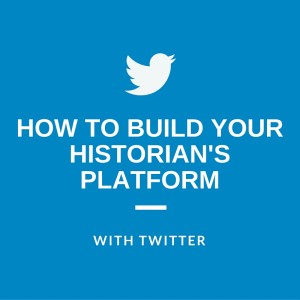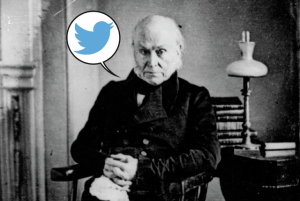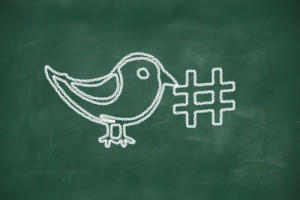 Do you use Twitter?
Would you like to know more about how you can use Twitter to build your historian’s platform?
Do you use Twitter?
Would you like to know more about how you can use Twitter to build your historian’s platform?
This post is the first in a 3-part series on how I use Twitter and how you can use it to build your historian’s platform. In this post, I will reveal why I love Twitter and why I use it.
The second post will discuss Twitter strategies you can use to draw attention to history and your research. The series will conclude with tactics for tweeting conference panels.
Why I Tweet
Twitter is my social media network of choice. I dabble on Facebook, Google+, LinkedIn, and Goodreads, but Twitter is where I prefer to spend my time on social media.
I love Twitter for three reasons:
1. Conversations and Networking
Twitter serves as my virtual watercooler. I am an unaffiliated scholar who often works from home or in cafes and libraries. This work-life offers great flexibility, but it can often be lonely. Twitter helps me cut the loneliness by allowing me to interact with colleagues when I want and need to.
 When I need a break from my work, I visit Twitter to see who else is hanging out online. I often start with the people on my friends and family feed, but I also check in with my favorite hashtags to see if anyone is talking about topics that interest me. You can find all sorts of different conversations if you know which hashtags to follow.
When I need a break from my work, I visit Twitter to see who else is hanging out online. I often start with the people on my friends and family feed, but I also check in with my favorite hashtags to see if anyone is talking about topics that interest me. You can find all sorts of different conversations if you know which hashtags to follow.
Note on Hashtags: Hashtags are the words with # in front of them. They let users know that a tweet is part of a larger conversation by defining either the audience or topic the tweet addresses. For example, #Twitterstorians is a tweet for historians on twitter. #RedSox lets fellow fans know you want to talk about the team.
Chatting on Twitter has helped me expand and maintain my social and professional networks. I have met many fantastic colleagues on Twitter by sharing information about history, asking questions, and by answering the questions of others.
 I frequently meet fellow historians on Twitter before I meet them in person. Our virtual relationship gives us an advantage. When we meet in person at a conference, or during a research trip, we often fall into an easy conversation because we already know what we like to talk about. Moreover, since we already know each other we are keen to introduce each other to our friends, which expands both of our professional and social networks.
I frequently meet fellow historians on Twitter before I meet them in person. Our virtual relationship gives us an advantage. When we meet in person at a conference, or during a research trip, we often fall into an easy conversation because we already know what we like to talk about. Moreover, since we already know each other we are keen to introduce each other to our friends, which expands both of our professional and social networks.
Twitter Tip: If you would like to meet other historians on Twitter checkout the hashtags #Twitterstorians, #Historians, and #PublicHistory.
2. News Source
Twitter provides me with a quick and easy way to check the news. Between the news sources and people I follow, I almost always know when something big, tragic, or important has happened. The people I follow almost always share links to interesting history, news, and sports articles too.
3. Digital Public History
Twitter not only connects historians with colleagues, it also connects people who love history with history and historians.
 Twitter allows users to share information quickly and unlike Facebook and other platforms that use algorithms to curate feeds, anyone who follows you or the hashtags you use will see the information you share.
Twitter allows users to share information quickly and unlike Facebook and other platforms that use algorithms to curate feeds, anyone who follows you or the hashtags you use will see the information you share.
Historians can, and do, use Twitter to increase awareness about history-related exhibits, tours, books, events, blog posts, conferences, and news. Sharing and promoting this information helps non-historians stay up-to-date with history-related news. It also helps them feel more comfortable about asking historians questions about history, what historic sites they should visit, and what history books they should read. This type of tweeting and interaction qualifies as public history.
Conclusion
Twitter allows historians to connect with colleagues, get news, and practice digital public history. This is why I love it.
In my next post, I will reveal strategies you can use to better enjoy Twitter and for how you can use it to build your historian’s platform.